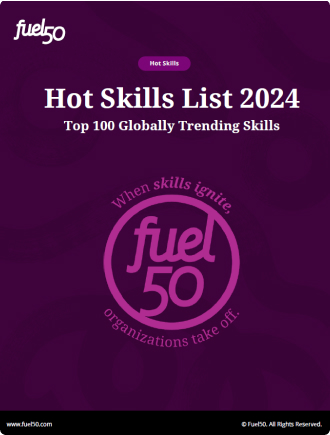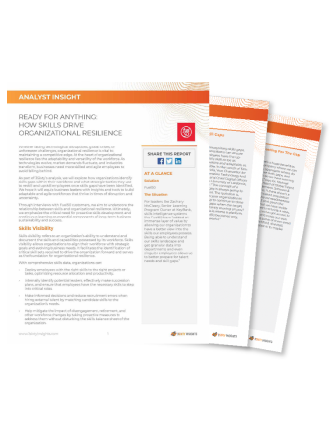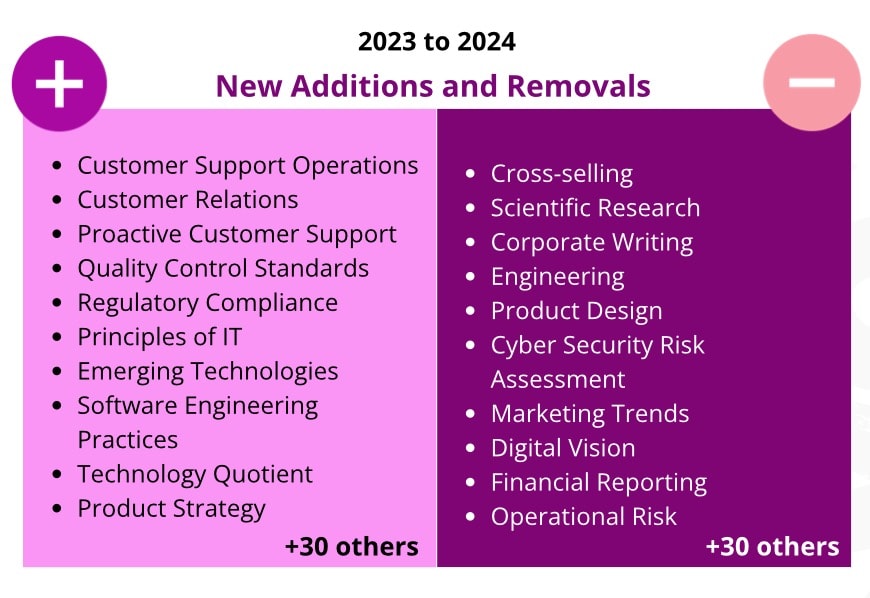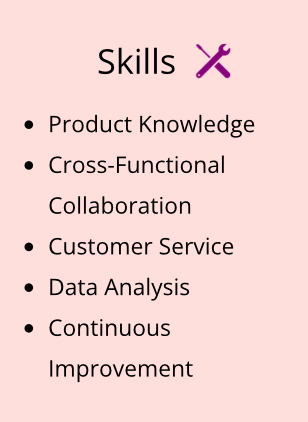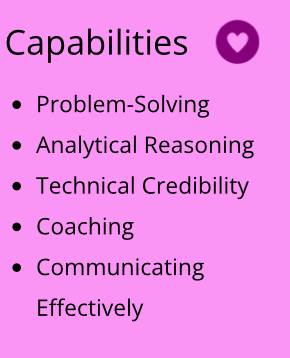As we unveil our annual analysis of the most-rated skills, we’re seeing fascinating shifts in how organizations are preparing for an increasingly dynamic future.
Our analysis highlights the in demand skills that are essential for thriving in the evolving job market of 2024 and beyond.
Our comprehensive analysis examines 80 specialist skills (domain-specific technical skills) and 20 capabilities (interpersonal/behavioral skills), offering unique insights into how the job market is evolving in response to technological advancement and changing business needs.
This year’s findings reflect a business landscape where the integration of artificial intelligence and human capabilities is no longer just an aspiration but a daily reality.
From software development to emotional intelligence, from data analytics to creative problem solving, the skills shaping our workforce are becoming increasingly sophisticated and interconnected.
What makes 2024’s analysis particularly compelling is the clear evidence of how organizations are adapting their skill requirements to meet both immediate challenges and future opportunities.
As more companies embrace digital transformation and new technologies, we’re seeing the emergence of hybrid skill sets that combine technical proficiency with human-centric capabilities.
The World Economic Forum’s insights on the future of work align with many of our findings, highlighting how the rapid evolution of technology is reshaping not just what we need to know, but how we need to learn and adapt.
This year’s hot skills list captures this dynamic, showing how traditional capabilities are being reimagined for a digital age while new skills are emerging to meet previously unimagined challenges.
Specialist In Demand Skills
This year’s analysis reveals fascinating shifts in the technical skills landscape. While artificial intelligence remained a dominant force from 2023, we’re seeing an evolution in how AI-related skills are valued, with particular emphasis on practical applications and integration across different business functions.
Cloud computing and machine learning have gained significant momentum, reflecting organizations’ continued drive toward digital transformation. The technical skills gaining traction aren’t just about understanding these technologies –– they’re increasingly focused on practical implementation and creating business value.
Some traditionally high-demand skills like basic data analysis have given way to more sophisticated capabilities. Similar to last year’s trend where Microsoft Office skills naturally phased out of the top 100, we’re seeing a shift toward more advanced technical skills that reflect the changing world of work.
In an interesting parallel to 2023’s emphasis on sales-related skills, 2024 shows these capabilities becoming even more deeply embedded across various functions. However, they’re now often paired with digital literacy and technical skills, creating hybrid skill sets that reflect the increasingly complex nature of modern business operations.
Several skills from last year maintained their significance, including big data management and cross-functional collaboration, demonstrating their enduring value in today’s business environment.
Decision-making capabilities, particularly when enhanced by technical understanding, continue to be crucial as organizations navigate an increasingly complex digital landscape.
Capabilities
While problem-solving maintained its critical importance from 2023, this year’s analysis reveals an evolving landscape of interpersonal and behavioral capabilities. Analytical skills are increasingly valued as organizations seek to implement advanced technologies and data-driven decision-making processes.
We’re seeing a notable shift in how organizations value and prioritize different aspects of emotional intelligence and decision making in response to increasingly complex business challenges.
The past year’s emphasis on process improvement has evolved into a broader focus on creating creative solutions and driving informed decisions.
As organizations continue to navigate uncertain economic conditions, the ability to not only identify efficiencies but also implement sustainable changes has become increasingly valuable.
Management skills have taken on new dimensions in 2024, particularly as teams become more distributed and digitally connected.
Building upon last year’s emphasis on Managing Teams and Building Relationships, we’re seeing these capabilities integrate more deeply with technical understanding – reflecting how interpersonal skills must now operate effectively in both physical and digital environments. Project management skills are essential for organizing tasks, coordinating teams, and communicating with stakeholders, enhancing overall professional efficiency.
Active listening and people skills have gained newfound importance, especially as organizations increasingly turn to hybrid work models.
These soft skills are no longer seen as separate from technical capabilities but rather as essential complements that enable better collaboration and innovation.
The ability to facilitate cross-functional collaboration continues to be crucial, building on its significance from 2023.
However, this capability now increasingly encompasses the ability to bridge traditional business functions with emerging technological initiatives.
So, what can we expect in 2025 and beyond?
As we look ahead, the convergence of traditional business capabilities with technological innovation continues to reshape the skills landscape.
Developing key skills will be crucial for career advancement in the rapidly evolving job market. The World Economic Forum’s Future of Jobs Report suggests we’re entering an era where the boundaries between soft skills and technical competencies become increasingly fluid.
The integration of AI technology is expected to accelerate, with generative AI and AI tools becoming fundamental components of various job roles. However, this shift emphasizes the growing importance of human capabilities that complement, rather than compete with, artificial intelligence.
The World Economic Forum’s Future of Jobs report highlights the importance of analytical skills, management, and digital literacy for futureproofing talent. Skills like creative problem solving, emotional intelligence, and informed decision-making are likely to become even more crucial as organizations seek to maximize the potential of human-AI collaboration.
We anticipate seeing the continued rise of hybrid skill sets, where technical skills like data analytics and software development merge with interpersonal skills and business acumen.
This trend suggests that future job opportunities will increasingly favor professionals who can bridge multiple disciplines and adapt to changing technologies while maintaining strong people skills.
The cybersecurity skills landscape is expected to evolve rapidly, reflecting the growing sophistication of digital threats.
Similarly, content creation and social media marketing skills are likely to transform as new platforms and technologies emerge, requiring professionals to continuously update their skill sets.
In the data space, we expect to see an evolution beyond basic data analysis toward more sophisticated applications, with data scientists and analysts increasingly needing to combine technical expertise with business strategy and communication skills.
Programming languages and web development skills will likely continue to evolve, with emphasis on adaptability and continuous learning.
As more companies embrace digital transformation, digital literacy will become not just a technical skill but a fundamental capability required across all organizational levels. This shift suggests that career paths will increasingly emphasize the ability to learn and adapt rather than mastery of specific tools or technologies.
Looking ahead, success in the changing world of work will likely depend on maintaining a dynamic balance between technical proficiency and human capabilities.
Organizations and individuals who can effectively integrate new technologies while preserving and enhancing uniquely human skills will be best positioned to thrive in the evolving job market.
Download the full Top 100 Hot Skills List 2024
1. LinkedIn (2023). https://www.linkedin.com/business/talent/blog/talent-strategy/linkedin-most-in-demand-hard-and-soft-skills#sales.
2. Nova (2023). https://www.novatalent.com/blog/the-importance-of-sales-skills-for-business-leaders-why-every-leader-needs-to-master-the-art-of-selling.
3. Udemy Learning Trends Report (2023). https://business.udemy.com/2023-workplace-learning-trends-report/?utm_source=organic-search&utm_medium=google
4. Airswift (2023). https://www.airswift.com/blog/expand-into-global-markets-quickly
5. Smarteventi (2023). https://blog.smarteventi.it/en/why-problem-solving-will-be-your-most-important-soft-skill-in-2023.html.
6. World Economic Forum (2023). Future of Jobs: These are the most in-demand core skills in 2023 | World Economic Forum (weforum.org).
7. LinkedIn (2023). https://www.linkedin.com/business/talent/blog/talent-strategy/linkedin-most-in-demand-hard-and-soft-skills
Written by Fuel50’s Workforce Architecture team
Contributors: Shelley-Ann Viljoen and Natalie Mabaso
Fuel50’s dedicated team of Workforce Architects and Industrial and Organizational Psychologists feed the Fuel50 Talent Ontology, train our ethical AI with Diversity, Equity, and Inclusion design principles at heart, and support best-in-class organizations using Fuel50 to transform and future-proof their talent strategy and workforce architecture.



